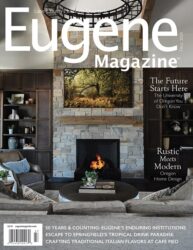With a retail and donation space on High Street in Eugene, the Material Exchange Center for Community Arts (MECCA) helps artists find affordable materials and supplies for their art. Community members donate their unused household items and art supplies. This way, what might have ended up in the landfill can live a second life in a sculpture, collage, or other creative project.
MECCA Executive Director Heather Campbell says the nonprofit exists in both the “environmental sector and the community arts sector,” dedicated to providing low-cost, no-waste opportunities for creative people to pursue their passions in Lane County.
MECCA launched in 1999 and moved to the larger High Street space three years ago. Cliff Martin, a founding board member, recalls MECCA’s early days in a garage. He was there when it moved to a location near the Amtrak station in downtown Eugene and, finally, to its current High Street spot.
Over the years, Martin says, “MECCA has grown in leaps and bounds and kept to its original purpose of providing art and crafts materials for teachers and artists, all from donated stuff.”
Customers can find unlikely inspiration in other people’s used or unwanted items, but MECCA now also hosts workshops and programming centered on, among other topics, “upcycling,” or using discarded or unwanted items to create something new, like a new piece of wearable clothing or other creative project.
Working artists often teach these workshops.
“We love to work with emerging artists,” Campbell says, “teaching people how to make money from their art, how to vendor at community markets, and how to gather supplies that aren’t cost-prohibitive.”
MECCA’s art supply thrift store, operated by staff and volunteers, accepts about 50,000 tons of unwanted items each year.
“We take everything from egg cartons and National Geographic magazines to canvases, oil paints, fabric and yarn, and knitting needles,” Campbell says. “Anything that can be used creatively.”
“We’ll take those items, clean them up, and organize them,” she says. “We either sell them affordably in our secondhand art supply shop,” or donate the items to Lane County educators who sometimes have to buy their art supplies, paid for out of pocket.
Mitra Gruwell, MECCA’s community engagement coordinator, plans and hosts special events at the nonprofit’s space and elsewhere in the community, as well as in-house educational programming in MECCA’s “classroom” at the High Street location.
Students at Eugene’s 4J School District’s Network Charter School use that classroom space on weekdays, meaning that at MECCA, someone is creating art almost every day.
In April, Gruwell produced MECCA’s Re-Imagine Earth Day at the Farmers Market Pavilion and Plaza in downtown Eugene.
“Local agencies, organizations, and businesses are doing cool things concerning sustainability,” Gruwell says. “But I realize our community at large is not aware.” They might engage with one or two organizations, like MECCA, she adds, but they don’t see the bigger landscape.
“I wanted Re-Imagine Earth Day to provide a glimpse of what that landscape looks like and what it feels like to engage with sustainability in a way that’s not a compromise,” Gruwell says, or that feels like you’re giving something up. Instead, sustainability can be fun, inspirational, and collaborative.
Before she worked at MECCA, Gruwell was an arts educator and an upcycled fashion designer. “That’s how I engaged with MECCA most,” utilizing their free art supply service for formal and non-formal educational settings, she says.
“That was a huge value to me,” Gruwell adds. Educators “can come to MECCA, get supplies and ideas for activities that are both helpful for the environment and also creative.” Eugene doesn’t have many other such incubator spaces for emerging artists.
“We need to think about how we’re going to bring kids up as artists,” she says.
“At MECCA, we offer the supplies and ideas: A low-barrier way to try out and find your art form.”
Campbell says her nonprofit is always seeking volunteers — interested people can find opportunities at MECCA’s website. “We have such a special community,” she says, “because people do care about sustainable living, people don’t like to throw their stuff away, and they care about upcycling and recycling things, creating that circular economy.”
“MECCA fits well in that community,” Campbell says, “and I’m glad we’re a part of it.”


